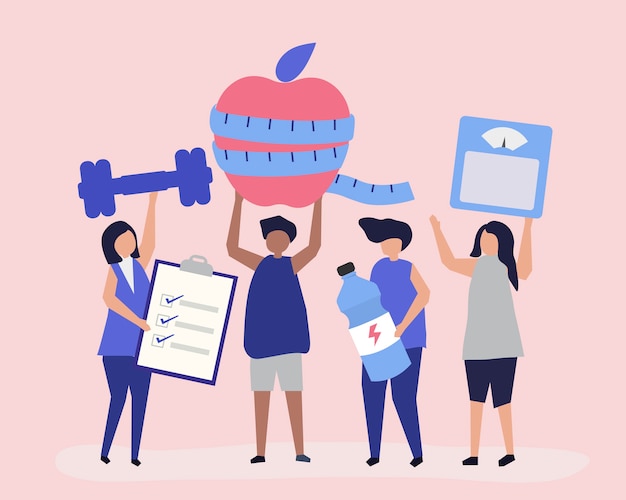
If you’ve ever been on a weight loss diet, you probably know that dieting is only half the journey. Once you go back to your old eating habits, the weight often returns—and sometimes, you might even end up heavier than before. This frustrating cycle is known as the yo-yo effect, but the good news is, you can avoid it with the right approach.
### Why Does the Yo-Yo Effect Happen?
The yo-yo effect is usually caused by things like:
– Losing weight too quickly.
– Returning to poor eating habits after the diet ends.
– Not being active enough.
### Tips to Stay Slim After Dieting
#### 1. Lose Weight Gradually
Rapid weight loss might seem appealing, but it often leads to rapid weight gain. Severely cutting calories—like eating less than 1,000 a day—isn’t a sustainable solution. Instead, aim to lose around 2 pounds per week. Slow, steady progress is more likely to help you maintain your weight over the long term. You can also try drinking a glass of water before meals; it helps you eat smaller portions without feeling deprived.
#### 2. Make Exercise Part of Your Routine
Exercise doesn’t just burn calories—it also boosts your metabolism and helps shape your body. A daily 30-minute workout can make a difference. If you’re not a gym fan, don’t worry! Regular brisk walks, cycling, swimming, or even activities like Nordic walking are great alternatives. Whichever option you choose, staying active is key.
#### 3. Practice Moderation at Social Events
Overindulging at the occasional party isn’t a big deal, but if parties happen frequently, try to eat just a little more than your usual portions. Opt for lower-calorie dishes like salads or roasted meats, and if dessert is on offer, have a smaller piece. This way, you can enjoy yourself without undoing your progress.
#### 4. Ease Back Into Larger Portions
After dieting, your metabolism is slower because your body naturally adjusts to fewer calories. So, don’t rush back to eating the way you used to. In the first week after your diet, add just one extra slice of whole-grain bread. In the second week, try a small serving of rice or pasta. Check your weight during this period—if you’re still losing, you can slowly add items like lean protein. The weight stabilization phase should last at least three months to help your body adjust.
#### 5. Learn Healthier Cooking Techniques
You don’t have to give up your favorite foods—just find better ways to prepare them. Use less fat when cooking and choose healthier options like olive oil, but keep these fats in moderation since they’re still high in calories. Steaming vegetables, fish, chicken, or lean meats retains more nutrients while keeping dishes light. If steaming isn’t your thing, roasting is another great alternative.
#### 6. Eat Smaller Meals More Often
Instead of three big meals a day, break it down into five smaller ones. This keeps your metabolism active throughout the day and helps prevent overeating. Breakfast is especially important, as it jump-starts your metabolism in the morning. If needed, set reminders on your phone to ensure you don’t skip meals, and try to avoid eating within two hours of bedtime.
#### 7. Build Balanced Meals
Each meal should include a mix of grains (for energy), fruits and vegetables (for vitamins and minerals), dairy products (for calcium), and protein-rich foods like legumes, fish, or lean meat. Fiber-rich foods like whole-grain bread, oats, rice, fruits, vegetables, and beans are particularly helpful because they make you feel full longer and help regulate digestion.
#### 8. Stay Hydrated
Drinking plenty of fluids is essential. Aim for about 2 liters of water a day, plus drinks like green or red tea, which can boost metabolism. Having a glass of water before meals can also reduce how much you eat because it fills your stomach and signals your brain that you’re not as hungry.
#### 9. Embrace Permanent Lifestyle Changes
If you tend to gain weight easily, you’ll need to keep an eye on your habits long-term. Commit to permanently breaking bad habits like snacking on sweets and fast food. Instead, focus on fresh, wholesome meals, staying active, and enjoying a healthier, balanced lifestyle. While the idea of giving up old habits might seem overwhelming at first, over time you’ll find that eating colorful salads and engaging in activities like cycling or swimming becomes second nature. Plus, you’ll feel amazing without those extra pounds weighing you down.
Ultimately, the best way to avoid the yo-yo effect is to skip the drastic diet altogether and adopt healthier habits that you can stick with for good. Cut out foods loaded with empty calories like candies, sweets, and fast food, and reduce your intake of salt, sugar, and unhealthy fats. Instead, season your meals with flavorful, metabolism-boosting spices. With these changes, you can maintain your weight loss and stay healthy for the long haul!